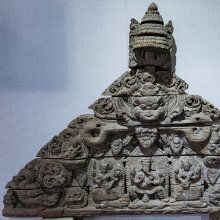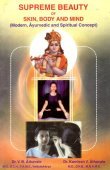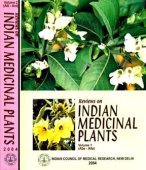Va: 20 definitions
Introduction:
Va means something in Hinduism, Sanskrit, the history of ancient India, Marathi, Jainism, Prakrit, Hindi, biology, Tamil. If you want to know the exact meaning, history, etymology or English translation of this term then check out the descriptions on this page. Add your comment or reference to a book if you want to contribute to this summary article.
Va has 19 English definitions available.
Images (photo gallery)
(+129 more images available)
Languages of India and abroad
Sanskrit dictionary
[Deutsch Wörterbuch]
Source: Cologne Digital Sanskrit Dictionaries: Böhtlingk and Roth Grosses Petersburger WörterbuchVa (व):—*) Was unter va nicht gefunden wird, suche man unter ba .
--- OR ---
Va (व):—1.
1) m. = varuṇa [Trikāṇḍaśeṣa.1,1,75.] [Hemacandra’s Anekārthasaṃgraha.1,14.] [Medinīkoṣa v. l.] [Oxforder Handschriften 189,a, No. 431.] Wind [Medinīkoṣa] und [Oxforder Handschriften a. a. O.] = sāntvana [Medinīkoṣa] = bāhu, mantraṇa, kalyāṇa, balavant, vasati und varuṇālaya [Śabdaratnāvalī im Śabdakalpadruma] = śārdūla, vastra, śālūka und vandana [NĀNAIKĀKṢARAK. im Śabdakalpadruma] —
2) f. ā going; hurting, injury; an arrow; weaving; a weaver (f.!) [WILSON] nach [Śabdaratnāvalī] —
3) n. = pracetas [Medinīkoṣa] = varuṇabīja [Śabdakalpadruma] nach einem [TANTRA.]
--- OR ---
Va (व):—2. indecl. = iva [Hemacandra’s Anekārthasaṃgraha 1, 14.] [Medinīkoṣa v. l.] [Raghuvaṃśa ed. Calc. 4, 42] [?(bei STENZLER] ca st. va). [Mahābhārata 12, 6597] wird maṇīvoṣṭrasya in maṇī va u, maṇī vā u, aber auch in maṇī iva u aufgelöst; vgl. zu [Pāṇini’s acht Bücher 1, 1, 11.] [Meghadūta 81] ist vā anzunehmen.
--- OR ---
Vā (वा):—
--- OR ---
Vā (वा):—
--- OR ---
Vā (वा):—3. , vāyati [DHĀTUP. 22, 24] (śoṣaṇe). avāsīt; auch med. in der Bed. von 2. vā; partic. vāna (s. bes.) und vāta .
1) matt —, müde werden, sich erschöpfen, erliegen: na vāyanti subhvo de.ayuktāḥ [Ṛgveda 7, 67, 8.] na tā vājeṣu vāyataḥ [8, 31, 6.] bapsada.nirna vāyati wird nicht müde zu verzehren [43, 7.] —
2) = 2. vā wehen: abhīkṣṇavātā vāyante dhūmaketumavasthitāḥ [Mahābhārata 6, 97.] — avāyat [Mahābhārata 9, 947] Druckfehler für avārayat . — ati heftig wehen: ativāyati bei heftigen Winde [Mahābhārata 12, 12420.] — abhi, partic. vāta matt, siech: abhivātāsu goṣu yā anabhivātāḥ syuḥ [LĀṬY. 8, 5, 3.] = vyādhita Comm. — ud matt werden, hinsterben, vom Feuer so v. a. in sich erlöschen [Taittirīyasaṃhitā 2, 2, 4, 7. 5, 7, 5, 1.] yasyāhava.īye nudvāte.gārhapatya u.vāyet [Taittirīyabrāhmaṇa 1, 4, 4, 6. 7, 2.] yadā vā agnirudvāyati [Chāndogyopaniṣad 4, 3, 1.] udavāsīt [The Śatapathabrāhmaṇa 10, 3, 3, 8.] — caus. ausgehen lassen: ā.a.a.īyamu.vāpya [Taittirīyabrāhmaṇa 1, 4, 4, 7.] — upa durch Vertrocknen ausgehen, eintrocknen: narāśaṃsaḥ Soma [Pañcaviṃśabrāhmaṇa 9, 9, 5.] [Śāṅkhāyana’s Śrautasūtrāṇi 13, 12, 10.] falsch upavāyāt (als ob von 2. vā) st. vāyet [Kātyāyana’s Śrautasūtrāṇi 25, 12, 10. 12.] kalaśamupavāyantaṃ prāṇo nūpadasyati [Kāṭhaka-Recension 35, 16.] vāta (Gegens. ārdra) trocken: Holz [ĀŚV. GṚHY. 3, 8, 4.] prakṣālitopavāta [Kauśika’s Sūtra zum Atuarvaveda 2.] — nis erlöschen: nirhyagniḥ śī.ena.vāyati [Taittirīyasaṃhitā 6, 2, 2, 7.] — Vgl. 2. vā mit nis simpl. und caus. — pra wehen: vardhamāne hutavahe vāte cāśu pravāyati [Mahābhārata 1, 8431.] naiva vātāḥ pravāyante [Harivaṃśa 10758.] — Vgl. 2. vā mit pra . — atipra heftig wehen: vāyunātipravāyatā [Mahābhārata 12, 12418.] — vi wehen: sarvagandhavahaḥ śucirvāyurvivāyamānaḥ śarīramaspṛśat [Mahābhārata 12, 13221.]
--- OR ---
Vā (वा):—
--- OR ---
Vā (वा):—
--- OR ---
Vā (वा):—4. desid. med. vivāsate herbeiziehen, gewinnen [Ṛgveda 8, 19, 24.] Hierher etwa auch act. vivasas oder vivāsas (vi . vasas Padap.) [Ṛgveda 7, 8, 3.]
--- OR ---
Vā (वा):—5. , asya sūtrasya śāṭakaṃ vaya [Patañjali] [?a. a. O.1,116,b. 244,b.] — upa, upoyamāna eingesteckt werdend: śūla [Aśvalāyana’s Śrautasūtrāni 3, 6, 23.] — sam zusammenheften: saṃ yadvayaṃ yava.ādo ya.ādaḥ [Ṛgveda 10, 27, 9.]
Source: Cologne Digital Sanskrit Dictionaries: Sanskrit-Wörterbuch in kürzerer FassungVa (व):—1. Indecl. = iva wie [20,2] (Conj.).
--- OR ---
Va (व):—2. —
1) m. = sāntvana , vandana , mantraṇa , vasati , varuṇa , varuṇālaya , kalyāṇa , balavant , bāhu , vastra , śārdūla śālūka und vāta. —
2) f. ā going ; hurting , injury ; an arrow ; weaving ; a weaver (wohl m. vā , Nomin. vās). —
3) n. = pracetas und varuṇabīja.
Sanskrit, also spelled संस्कृतम् (saṃskṛtam), is an ancient language of India commonly seen as the grandmother of the Indo-European language family (even English!). Closely allied with Prakrit and Pali, Sanskrit is more exhaustive in both grammar and terms and has the most extensive collection of literature in the world, greatly surpassing its sister-languages Greek and Latin.
See also (Relevant definitions)
Starts with (+9980): Bahavalli, Bahavallirasa, Bahihkarana, Balakridanaka, Bandhuka, Barbara, Barbarasthala, Batukadvaya, Va la, Va rub, Va-bhu, Va-kep, Va-pana, Vaachaki, Vaacharth, Vaad, Vaad-kudaradi, Vaada, Vaadachinta, Vaadaganneru.
Ends with (+9980): Aaduva, Aamtavva, Aavva, Abadhitva, Abadhyabhava, Abadhyashva, Abahava, Abalasattva, Abalatva, Abalava, Abaliyastva, Abamva, Abandhava, Abbhakshatva, Abbhuggantva, Abdapurva, Abdarava, Abdhiprabhava, Abhagitva, Abhakshyatva.
Full-text (+6028): Abandhava, Nava, Ekabhava, Parikshiva, Gatavibhava, Adhobhava, Vaspaviklava, Sudiva, Duraplava, Viviktabhava, Mahanubhava, Samudbhava, Gosambhava, Anamiva, Purodbhava, Vam, Sankalpasambhava, Grishmodbhava, Agudhabhava, Abhinava.
Relevant text
One of your search terms exceeds the minimun character amount per search term. This amount currently equals 2.
No search results for Va, Vā, Vaa; (plurals include: Vaas) in any book or story.
Related products







